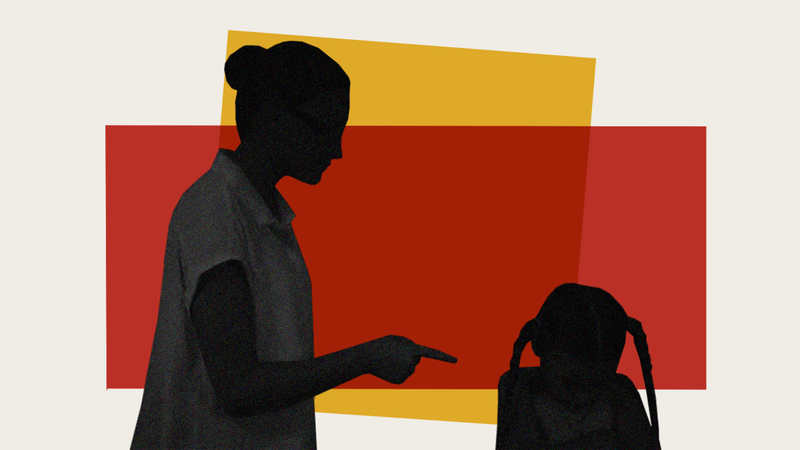19 Signs Your Parents Undermined Your Confidence and Personality
Not all wounds are visible, and not all “harmless” comments were harmless at all.
Let’s get honest about something uncomfortable: Sometimes, the people who raised us—who were supposed to love and protect us—were also the ones who unintentionally (or sometimes very intentionally) chipped away at who we were becoming.
If you were told to “toughen up,” “stop being so dramatic,” or “be more like your sister,” you might still be carrying that shame in your adulthood. And it doesn’t mean they were evil. It doesn’t mean you’re weak.
It means you were a child—sensitive, curious, creative, emotional—and your authenticity was met with criticism instead of support. Here are 19 signs your parents may have undermined your confidence and personality in subtle, lasting ways:
1. You Constantly Second-Guess Yourself

Ever notice how even picking a lunch spot feels like a huge decision? That’s not because you’re indecisive—it’s because somewhere along the way, someone made you doubt your own judgment.
You might find yourself replaying conversations in your head, wondering if you said the wrong thing or made the wrong call at work. Sometimes, you even need reassurance over the simplest choices, like what shoes to wear or which text to send.
It’s exhausting, isn’t it? That constant tug-of-war inside your head comes from years of someone else second-guessing you. If nobody taught you to trust your gut, you end up asking everyone else for their opinion. At some point, you have to realize: those voices aren’t yours. They were planted there by someone who couldn’t see your potential, but you can learn to see it now.
2. You Struggle to Say What You Really Think

Ever catch yourself rehearsing what you want to say long before you actually say it? It’s like there’s a filter, but it’s not your own choosing—it’s survival mode from a childhood where honesty came with consequences.
You might nod along when you disagree or soften your opinions so nobody gets upset. Sometimes, you even avoid sharing your real feelings because you expect backlash or eye rolls instead of understanding.
Growing up, you learned that speaking your mind was risky. Maybe your parents rolled their eyes or shut you down, so you stopped trying. But your voice matters. The world needs the real you—the one with opinions, boundaries, and all. Don’t let anyone convince you otherwise.
3. You Apologize for Existing

Let’s be real: if “sorry” is your favorite word, you didn’t choose that habit—it was trained into you. Maybe you apologize when you ask for help, or even when someone bumps into you. Sound familiar?
You might shrink yourself in conversations, trying not to take up too much space. It’s almost like you believe your needs are inconveniences, and you want to make yourself invisible so you don’t cause trouble.
When parents made you feel like a bother every time you had an opinion, you learned to say sorry for just… being. But you’re not a burden. You’re allowed to exist—loudly, gently, messily, all of it. Nobody should make you feel otherwise.
4. You’re Terrified of Being “Too Much” for People

Ever feel like you’re always dialing yourself down—your laugh, your opinions, your style? That’s the residue of someone telling you that your personality was “a bit much.”
Maybe you shrink in busy rooms or second-guess sending that enthusiastic text. You learned early that being fully yourself led to drama, criticism, or even silent treatment.
But here’s the secret: you were never “too much.” You were exactly enough—just maybe not for the people who didn’t know how to celebrate you. Life’s too short to play small. Let your sparkle blind the ones who wanted you dimmed.
5. You Work Overtime to Earn Love and Approval

Overachiever alert! If you equate love with gold stars, it’s probably because you learned that praise was attached to performance.
Late nights, extra projects, being the “reliable one”—maybe that’s how you tried to fill the empty spaces your parents left by withholding affection unless you excelled. You might struggle to relax, always hustling to prove you’re worthy.
But here’s the wild part: you were lovable before you did a single thing. That hustle wasn’t your choice—it was survival. Now, you get to choose your own worth, and it’s not measured in spreadsheets or trophies. You’re enough just being you.
6. You’re Uncomfortable With Praise

Compliments feel like hot potatoes—you catch them, but you don’t know what to do with them. When someone says you did great, your first instinct is to deflect, deny, or make a joke.
Growing up, you might’ve been told not to get a “big head,” or maybe your efforts got ignored altogether. So now, you’re suspicious of positive feedback, wondering if they’re just being polite.
You’re not alone. But hear this: praise isn’t a trap. It’s okay to bask in a little “well done!” without guilt. Take the compliment. You’ve earned it, even if it feels strange at first.
7. You Feel Guilty for Taking Up Space

If you’re always finding the smallest corner in a room, it’s not a coincidence. You learned that being seen or heard brought trouble.
Maybe you apologize for needing help or hesitate to voice your thoughts in meetings. It’s the kind of guilt that follows you everywhere—like your presence needs a permission slip.
But you don’t have to shrink to fit someone else’s comfort zone. You deserve a seat at every table, just as you are. Take up space like you mean it, even if your voice shakes the first few times.
8. You’re Hyper-Aware of How Others Perceive You

Every glance, every tone—sometimes you read into them like you’re solving a mystery. Growing up, you learned that approval was earned by being perfectly behaved, so now you’re always on alert.
You might replay conversations to search for hidden meanings. Social events become exhausting because you’re busy managing everyone else’s feelings.
It’s not your job to micromanage perception. You’re worthy, even if someone misreads you. Life gets lighter when you let people think what they want and focus on what you actually want.
9. You Were Compared to Siblings or Other Kids—Constantly

“Why can’t you be more like your brother?”—sound familiar? Nothing bruises like feeling like someone else is the standard you’ll never meet.
You might remember every spelling test or soccer game as a competition, not a celebration. Even now, you might compare yourself to colleagues or friends without meaning to.
Comparison is a thief, but it started because someone handed it to you. The truth: you’re incomparable. Nobody else gets to be you, and that’s your superpower.
10. You Were Told to “Calm Down” Whenever You Showed Emotion

Somewhere along the way, you learned that feelings were “too much”—especially yours. Tears? Overreaction. Anger? Disrespect. Excitement? Embarrassing.
So now, you might bottle everything up, afraid to let emotions show. Or, when you finally do express them, you feel out of control—like something is wrong with you.
Your feelings aren’t flaws. They’re signals from your heart about what matters to you. Don’t let anyone convince you to silence them. You deserve to feel, fully and unapologetically.
11. You Were Ridiculed for Your Interests or Passions

Did your face light up about something—only to be met with sarcasm or a snarky joke? That kind of ridicule is brutal when you’re just figuring out who you are.
Maybe it was your love for anime, bugs, or baking. Instead of encouragement, you got eye rolls or outright teasing. So you learned to hide the things you cared about most.
Now, you keep your passions secret, worried they’ll be mocked. But those quirks? They’re what set you apart. You deserve friends—and family—who cheer for your sparkle, not shame it.
12. You Still Feel Like You Have to “Earn” Rest

If you feel lazy just for taking a nap, thank your childhood for that guilt trip. Rest was probably treated like a luxury you had to earn, not a necessity.
You might notice you can’t relax unless every chore is done, every email answered. Even then, you’re waiting for someone (even if it’s just in your head) to accuse you of slacking.
But here’s a truth bomb: rest isn’t a reward. It’s a basic need. You don’t have to deserve it—you just need it. Permission granted, forever and always.
13. You’re Emotionally Reactive—Or Completely Shut Down

Some days, everything feels like too much. Other days, you go numb. Both are survival tactics you picked up because nobody taught you how to handle big feelings.
If you explode over tiny annoyances or shut down during conflict, it’s not because you’re dramatic or cold—it’s because your emotional toolkit had some missing pieces.
It’s never too late to start learning. Finding balance with your emotions is possible, even if you grew up without a safe space for them. Your feelings deserve room to breathe.
14. You Don’t Know Who You Are Without External Validation

Who are you when no one’s watching? If you have no idea, welcome to the club of people raised to perform, not to be themselves.
Maybe you change your style, hobbies, or opinions depending on who you’re with. Approval feels like oxygen—and without it, you panic.
It’s scary to discover who you actually are, but it’s also freeing. You get to define yourself, not your critics. Validation is nice, but it’s not a substitute for self-knowledge. Your worth isn’t up for debate.
15. You Feel Uncomfortable Celebrating Yourself

Blowing out candles shouldn’t feel awkward, but here we are. If celebrating yourself feels uncomfortable or even embarrassing, blame the grownups who taught you humility at the expense of self-worth.
You might downplay your wins or change the subject whenever someone congratulates you. Deep down, you crave recognition but don’t know how to accept it.
Celebration isn’t arrogance—it’s acknowledgment. You deserve to be your own hype woman sometimes. If others won’t clap for you, start clapping for yourself.
16. You Attract (or Stay in) Relationships That Feel Familiar… But Not Safe

Notice a pattern with the people you date or befriend? If chaos and criticism feel more familiar than comfort, you might be stuck in a loop from your childhood.
You find yourself drawn to relationships where you have to win approval or “fix” someone. When love and criticism were always mixed together, you start thinking that’s just how it works.
But love shouldn’t feel like a battlefield. You deserve safety, softness, and support—not anxiety and confusion. Familiar doesn’t always mean healthy. You can break that pattern.
17. You Sabotage Opportunities Before They Sabotage You

If you’ve bailed on plans, ghosted friends, or quit projects you cared about, you know self-sabotage intimately. It’s your armor against disappointment.
Deep down, you hear that voice: “Why bother? You’ll mess it up anyway.” That voice sounds suspiciously like someone from your past.
You deserve to see what happens if you stay in the game. The only way to rewrite the ending is to stop writing yourself out of your own story. You’re braver than you think—just give yourself the chance to prove it.
18. You Struggle With Boundaries—Either Overly Rigid or Nonexistent

Do you find yourself saying yes when you mean no—or building walls so high no one can reach you? That’s a boundaries issue, courtesy of your childhood.
When parents trampled your limits, you learned your needs didn’t matter. Now, you might give too much, or refuse to let anyone close, afraid of getting hurt again.
Healthy boundaries are a skill, not a character flaw. You get to decide what feels safe, what feels right, and who gets access to your time and energy.
19. You’re Just Now Learning That It Wasn’t Your Fault

The most heartbreaking “aha” moment is realizing the way you were treated as a kid wasn’t because of who you were, but because of what someone else couldn’t give.
You spent years believing you were the problem—that if you were less loud, less sensitive, less needy, you’d finally be loved right. That’s a heavy burden to carry.
But you were never the issue. You were just a kid, craving love in the best way you knew how. Now, you get to give yourself that compassion.







